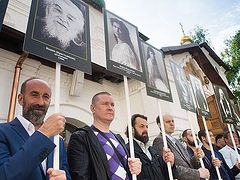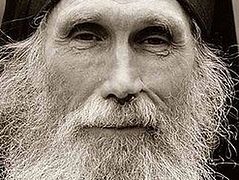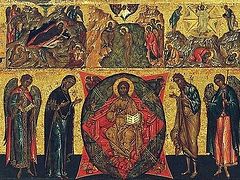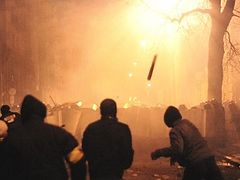The saints who shone forth in the Russian land answer a question that many ask but don’t seek the answer in those saints. What does it mean to be Russian?
Every person has an instinctive need to belong to a nationality, and this is natural—we were not created as dry sand, but as a body, an organism; and each of us needs to find his place in the family of man. There is no such thing as abstract people; people always belong to some form of social group, like a family or a nation, and losing this belonging deprives a person of something very important.
What does it mean to “be Russian”? To come from Russian parents? Our remarkable Russian saint, Grand Duchess Elizabeth Feodorovna was born to a German family, and many of our saints have Hungarian, Tatar, Jewish, or many other different ethnic roots. At the same time a person who is a hundred percent Russian can become a hater of Russia, and there are unfortunately more than enough of these.
Does it mean thinking and speaking in Russian? Yes, but that is not enough—alas, many things that are now being written in Russian are being written by people who are implacable enemies of everything Russian.
Does it mean fighting the nation’s enemies? Worldly nationalism usually identifies itself through the opposition of “us” against “them”—enemies, outsiders, foreigners. The loyalty to “ours” is shown through enmity toward whatever is named “not ours”. Alas, this is something that is taken for granted in our fallen world—the solidarity of “ours”, or “national unity” is acquired through dislike of what is “not ours”, and alas, we now have before our eyes a very grievous example of how an attempt to acquire “national unity” in this way has brought nothing but troubles and calamity. As we see, this sort of nationalist can be quite indifferent to national history and culture, determining itself purely through negativism—through enemies, to whom of course, they wish only death. Take the enemies away from a nationalist and they are left with nothing. Place them on a planet where there are no enemies and they will immediately call each other the enemy, because the very image of their existence is division and hatred.
The Church glorification of national saints is something diametrically opposite to that. It gathers and does not scatter; it makes peace and does not cause fights. God’s saints were no one’s enemies. They belong to a new, redeemed mankind, in which there is no enmity and fighting, no rejection and hatred. They are the ones whom God gathered into His Kingdom, and we know that there in the heavens, with God, there are many of our compatriots not only in spirit but in origin, language, and culture.
In the saints we see God’s plan for our people. In them Russian history, Russian language, and Russian culture gain their justification, meaning, and destiny. Our people exist and should exist, and are worthy of loyalty, care, and preservation, because in them saints have appeared and will appear. In the Russian saints the eternal Gospel, good and saving for all peoples, acquires a unique Russian sound, and national culture becomes what it should be—the bearer of piety.
Orthodoxy is not a national religion but the truth for all peoples. But we should with amazement and gratitude experience the fact that our culture and history is penetrated—more than that, created by the Orthodox faith.
Every nation identifies itself with its heroes—through those whose lives are perceived as examples of those in whom people (in this era at any rate) see the glory of their nation, what that nation has brought to the world. Sometimes whole nations fall into a state of serious mental darkness, like we Russians did after 1917, when the names of saints where scratched off the geographical maps, and cities, streets, and squares were renamed after bandits and terrorists.
Sometimes people see the glory of their country in people who are undoubtedly more worthy—scholars, poets, composers, or artists. They are remembered and praised. There is nothing wrong with this. But there is something better.
It is best of all when people identify their nation through its saints—not through earthly glory but through heavenly glory. When we remember that we have writers whom the whole world reads—and are grateful for this—but consider the most important thing to be that we have saints who intercede for us in prayer before the throne of God.
Not everyone is destined to become a great scholar, poet, or artist. But each of us is called to serve his people in something much for important—the striving for sanctity. The people need their saints—those who will seek God and His holy will with all their hearts and souls. That is what many generations of saints before us who shone forth in the Russian land did. And to be Russian means to be the heirs to those saints.






